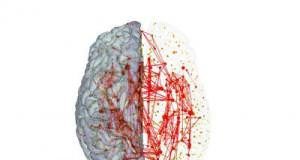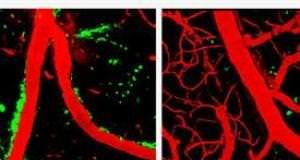Feel-Good Glass For Windows
Daylight acts on our body clock and stimulates the brain. Fraunhofer researchers have made use of this knowledge and worked with industry partners to develop a coating for panes of glass that lets through more light. Above all, it promotes the passage through the glass of those wavelengths of light that govern our hormonal balance.
Success Reported In Treating Autism Spectrum Disorder In Mice
Using a mouse model of autism, researchers at the University of Cincinnati (UC) and Cincinnati Children's Hospital Medical Center have successfully treated an autism spectrum disorder characterized by severe cognitive impairment. The research team, led by Joe Clark, PhD, a professor of neurology at UC, reports its findings online July 2, 2012, in the Journal of Clinical Investigation, a publication of the American Society for Clinical Investigation.
Highways Of The Brain: High-Cost And High-Capacity
A new study proposes a communication routing strategy for the brain that mimics the American highway system, with the bulk of the traffic leaving the local and feeder neural pathways to spend as much time as possible on the longer, higher-capacity passages through an influential network of hubs, the so-called rich club.
Keeping Pace: Walking Speed May Signal Thinking Problems Ahead
A new study shows that changes in walking speed in late life may signal the early stages of dementia known as mild cognitive impairment (MCI). The research is published in the June 12, 2012, print issue of Neurology®, the medical journal of the American Academy of Neurology.
Early Gut Bacteria Regulate Happiness
UCC scientists have shown that brain levels of serotonin, the 'happy hormone' are regulated by the amount of bacteria in the gut during early life. Their research is being published June 12 in the international psychiatry journal, Molecular Psychiatry.
Lack Of Sleep Makes Your Brain Hungry
New research from Uppsala University shows that a specific brain region that contributes to a person's appetite sensation is more activated in response to food images after one night of sleep loss than after one night of normal sleep. Poor sleep habits can therefore affect people's risk of becoming overweight in the long run.
Brain Scans Show Specific Neuronal Response To Junk Food When Sleep-Restricted
The sight of unhealthy food during a period of sleep restriction activated reward centers in the brain that were less active when participants had adequate sleep, according to a new study using brain scans to better understand the link between sleep restriction and obesity.
High Blood Caffeine Levels In Older Adults Linked To Avoidance Of...
Those cups of coffee that you drink every day to keep alert appear to have an extra perk -- especially if you're an older adult. A recent study monitoring the memory and thinking processes of people older than 65 found that all those with higher blood caffeine levels avoided the onset of Alzheimer's disease in the two-to-four years of study follow-up. Moreover, coffee appeared to be the major or only source of caffeine for these individuals.
Well-Connected Brains Make You Smarter In Older Age
Brains that maintain healthy nerve connections as we age help keep us sharp in later life, new research funded by the charity Age UK has found. Older people with robust brain 'wiring' -- that is, the nerve fibers that connect different, distant brain areas -- can process information quickly and that this makes them generally smarter, the study suggests.
This Is Your Brain On Sugar: Study In Rats Shows High-Fructose...
Attention, college students cramming between midterms and finals: Binging on soda and sweets for as little as six weeks may make you stupid. A new UCLA rat study is the first to show how a diet steadily high in fructose slows the brain, hampering memory and learning -- and how omega-3 fatty acids can counteract the disruption. The peer-reviewed Journal of Physiology publishes the findings in its May 15 edition.
Alzheimer’s Gene Causes Brain’s Blood Vessels To Leak Toxins And Die
A well-known genetic risk factor for Alzheimer's disease triggers a cascade of signaling that ultimately results in leaky blood vessels in the brain, allowing toxic substances to pour into brain tissue in large amounts, scientists report May 16 in the journal Nature.
Psychiatric Medications’ Effect On Brain Structure Varies
It is increasingly recognized that chronic psychotropic drug treatment may lead to structural remodeling of the brain. Indeed, clinical studies in humans present an intriguing picture: antipsychotics, used for the treatment of schizophrenia and psychosis, may contribute to cortical gray matter loss in patients, whereas lithium, used for the treatment of bipolar disorder and mania, may preserve gray matter in patients.

















